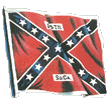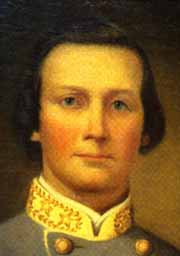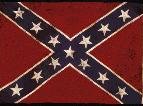|
South Carolina C.S.A.
|

|
|

|
South Carolina C.S.A. |
|
|
|
For only the living suffer pain. I love stories, and most of them are best when they are left to tell themselves. There are some things I think need to be underlined here. This is the story of a father and a son, first and foremost. It is also the story of Captain Thomas Holtzclaw's unit, Company H, Palmetto Battalion Light Artillery and the story of Company F, Sixteenth South Carolina. It is a story of the Brushy Creek Community of Greenville and Brushy Creek Baptist Church and it is the story of the south. The first two letters are from the father, Pleasant W. Hudson. He and his son are at the middle of the long Atlanta Campaign. The third letter is from the son, E.P. Hudson. They are all written to the same woman, the mother and wife. They are written as this father and this son arrives to join an already bitter and deadly battle. The are coming from a unit that has been ruled to have been formed illegally and they hope the unit will be formed again or that they may be allowed to return to Company A of that unit, in service on the coast of South Carolina. This will not happen and they will follow Hood's Army into Tennessee. The next letter in the newspaper article is written early in that campaign and the father knows his fate, as he probably has for some time. Both father and son will survive the attack at Franklin and the long winter retreat from Nashville. At Pulaski, Tennessee, Pleasant, the father can simply go no more. Typhoid fever has taken its toll, as has starvation, and privation of every type. He is left in a hospital, in the last town before the shattered army starts to cross rivers. The devoted son, who he will never see again, leaves him. He dies in the hands of strangers in the Union Army and his grave is unknown to me. Many would say this is a sad but unique story. That it tells of bad luck. In the south this story is not unique it is not even unique to the Army of Tennessee or Gist's Brigade or even the Sixteenth South Carolina. There is another father and son who left the Palmetto Light for the Sixteenth at the same time as this father and son. Wood Garrison would go home to serve in the militia. He would read the words from his loving son, telling him to do whatever he had to do, but don't come to Atlanta and don't join the Sixteenth. He was obedient to his sonís wishes but he too was touched. His son, Wat Garrison, served faithfully in Company B of the Sixteenth South Carolina, until he died coming down Winstead Hill in November at the Battle of Franklin. So E.P. Hudson was never allowed to bury his father and Wood Garrison was never allowed to bury his son... and somehow life went on. As you can see from the closing article, from the Confederate Veteran, printed long after the war, Pleasant Hudson's ghost did not die as easily as his body; neither did Wat Garrisonís. Dishonor or forget these ghosts? I think not, for their blood forged what we are today. |
|
Extracts from the Hudson Family History Clipping Source Unidentified, Probably Greenville News August 9, 1864 My Dear Wife and Children, I am once more permitted through the kindness of God to write you a few lines that will inform you that I am not very well but I hope with an indulgent heart that these lines may find you all well. I am here in front of the enemy exposed to the bullets and burn shells night and day and hardly have time to write but those keen reflections I have for you all that I cannot but feel sad when I think of home sweet home, there is no place like home and if I only could be permitted to stay with you all, I would willingly sacrifice all that I possess and begin over but I trust in God that I will be spared to see and be with you all once more. I have been here in camp two weeks, and three weeks since I left home and have not heard a word from you. I want you to write if you please and let me know how you are getting along. Let me know how all the children are and how much wheat you made. If Captain George(Thomas?) Holtzclaw has established his company or not, me and Edward have swapped to Earlís Company but we cannot get away for some time yet. |
|
August 23, 1864 My Dear Wife, I will finish this letter to you. Iím not well this morning. I feel worse than I have any time since I got to camp. I truly hope these lines may find you and my sweet little children all well, for there is no parent knows how sweet a good wife and children are until they are placed in our fix for we donít know one day that we will ever see another, but I trust in God and pray that He will spare our lives to see each other once more in this world. You must write to me and let us know how you all are doing. And you must take good care of yourself and not worry about me any more than you can help. So I will close for this time. Farewell, Pleasant Walker Hudson Atlanta Georgia, Army Tennessee |
|
August 23, 1864 Dear Mother, I take the pleasure of writing you a few lines. I hope they may find you all enjoying good health. I have no good news to write only that I have been spared until now. They have been fighting on the picket lines every day more or less, someone getting killed and wounded every day, but we have not had none wounded in several days. I would like it for to remain so, the balance of the time I have to stay here. I wish Captain Holtzclaw would make haste and do what he is going to do. I have to swap to Captain Earlís Company, but I can not get away from here until this fight is settled, but if they donít get his Company back I intend to go to his Company just as soon as I can get the chance. I got a letter from Ruben today. He said that it was reported in their Company that we were all taken prisoners and said the news came from Greenville. I am very sorry to think it got out when it was not so, for I expect you were in a right smart of trouble. But you can tell them that it is all a mistake and I hope it never will be so. The times are very hard out here. Sometimes we have to work all night. That is hard for me. That is something I never was used to, but I have to put up with it. We get very poor rations to eat. A little beef and cornbread and a little piece of bacon that wears me out directly. Papa has not been well since he came off picket and that was Sunday. Since he came here this service donít suit him for he is not able to stand it, but I hope the Lord will smile upon him and send back to you as a husband and father. I would like powerful well to be in Greenville now to eat beans and bacon for I have been wanting some ever since I left home but as you know it is no use to cry after spilt milk. I want you to send me a cake of soap, some that I can take in my pocket. We donít have any out here and if we wash our clothes we have to wash them in cold water and without soap and you know that is a poor way of doing business. WF Smith has gotten a little better. He can open his eye, but one is entirely out, He is up and walks about a little. The doctor could not get the ball out of his head. I think he will get well provided he is rightly attended to. Tell Aunt Susan that I think she might write to me, but if she donít I intend to write to someone else. I have written her three times and I have not received the first scratch of a pen yet. You tell Mike when he is going on to his meeting of Sunday I am picket watching for the Yankees. I heard they were going to have a protracted meeting at Brushy Creek. I would like the best in the world to be there with you so I could go to meeting some. I have not heard any preaching since I have been here. If it rains out here we just have to stand and take it. Give my love to all inquiring friends and accept a large share for yourself. So I close by saying I remain as ever your true and devoted son until death. Write soon, Edward Pierce Hudson |
|
Pleasant Walker Hudson Writes Wife In Greenville, South Carolina Of His Life With Army of Tennessee; Typhoid Victim Yesterday the pitifully small remnants of the Blue and the Gray gathered at Gettysburg to hear the president speak to them as citizens of one nation. But nearly 74 years ago there were two nations and two presidents, embroiled in a bitter conflict. That strife lived again today in a faded letter, the paper yellowed by time, written by a Confederate soldier to his Greenville County wife. The veteran was Pleasant Walker Hudson. His letter, now in the hands of his granddaughter, Mrs. Robert Luther Waldrop, Sr. of 207 Whitsitt Street, was written September 28, 1864, from West Point, Georgia, where the Army of Tennessee was fighting off cold, hunger, privation and the Grand Army Of the Republic. TELLS OF HARDSHIPS The terrible handicaps under which the Southerners fought is reflected in these lines; My Dear Wife and Children, I again write you a few lines through the kindness of God to inform you that I am in common health but never well. Edward is well and I truly hope that these lines may find you and the children all well. I received your letter and brandy and soap you sent by John Vaughn and was truly glad to hear from you once more, and the brandy was very acceptable, but it was soon gone. I hope you will send me more whenever you can get the chance, but it is a bad chance, I know. And I want you to send my overcoat by somebody if you can get them to bring it. WEATHER GETTING COLD If you can get it here by the 10th of December it will do. The weather is getting cold here now and I am afraid we will suffer greatly with cold this winter for I only have a thin blanket and Edward one. I threw my bed quilt away long ago for I could not tote it. I think if I can get to Earleís company you may look for me at home about Christmas, but I will have to come without leave. But I think I will come if I live that long, but donít tell anything about it for I donít intend to stay here if I can help it. It may be that my papers will come back alright to go to Earleís company. If they do I am coming by home certain. I will come on the train until the first of December, and if they donít come I donít say, but you need not be surprised to see me at home. We are here at this place all quiet and the Yankees is 15 miles of us, but I think we will have to move on towards Alabama in a short time. We still draw nothing like enough to eat and I am so weak I am no account for nothing. You would hardly know me I am so poor, but you need not be uneasy about me. I will do the best I can. HOPES TO LIVE I want you to take good care of yourself and not work too hard, for you and my sweet little children are my all in this world. If it were not for you I had almost as leave be dead, but I hope to live to see you all again. Tell Jerry that he must push on with his work and sow his wheat and rye as soon as he can and you had better get some bluestone and soak your wheat, if you donít it will half be smut next year. Kill your beef when you want to and get Green to tan the hides as he did last year, and get your shoes made as cheap as you can. You need not save any leather, for me and Edward will make out other ways. I was very glad to hear that Susan had joined the church. Give my love to her and tell her to press onward for that happy land that is prepared for all of Godís people. My daily prayers are that I may hear of you, my dear wife, making peace with your God and joining the church and go with us. I trust that you will pray in sincerity and God will hear your prayers. Give my love to mother and tell her that I read her letter that she sent by Vaughn and will write to her when I can. But it is not often that I can get paper and envelopes, for we are all out of money, so I close by hoping to hear from you soon. Farewell, dear wife and children HOPES ARE FUTILE His hopes of seeing his family again were never realized. Far from home and among only such friends as he made in the Army, the soldier contracted typhoid fever not long afterward and died. But one wish expressed was fulfilled. His wife joined the Brushy Creek Baptist Church. Today she and most of the children are dead, but from their Home on the Pelham Road has come a long line of descendants, most of them still live in this county. |
|
The Confederate Veteran Vol. XX, page 397 |
|
He was subject of excruciating pain but throught all his suffering while in the Army he exhibited untiring patience and unshaken faith in the Redeemer.He became a member of Brushy Creek Baptist Church September 1, 1860. On March 23, 1918 his son, Edward Pierce Hudson, received a letter from a member of the Unted Daughters of Confederacy saying she thought his father's grave was one of those in the little plot that the UDC took over. A stone curbing is around it with the words "confederate dead" on the gate and little markers at the grave and she thought P. W. Hudson's name was on one of them. This little plot is always decorated on the third of June by the UDC ladies. Nothing further was learned because this UDC member died." In Memory: As told by Edward Pierce Hudson to his daughter, in memory of his father, Pleasant Walker Hudson; "His intelligent faith and pure devotion to Christ and Church gave him great force of character, the dominance of him, gentleness has been an inspiration to his children. He had wisdom to choose and courage to avow his belief in the Christian Religion. He had an amiable disposition, urbanity of manners was regulated, dignified by the most exalted principles. He was a pleasant companion and faithful friend. The writer recalls her father Edward Pierce Hudson saying his father read and studied at every opportunity and possessed himself of a good education in their day. He was a man of fine and generous impulses, with strangers rather quiet and retiring, but to the troubles and happiness of others his heart was always there." |

|
|
|

|